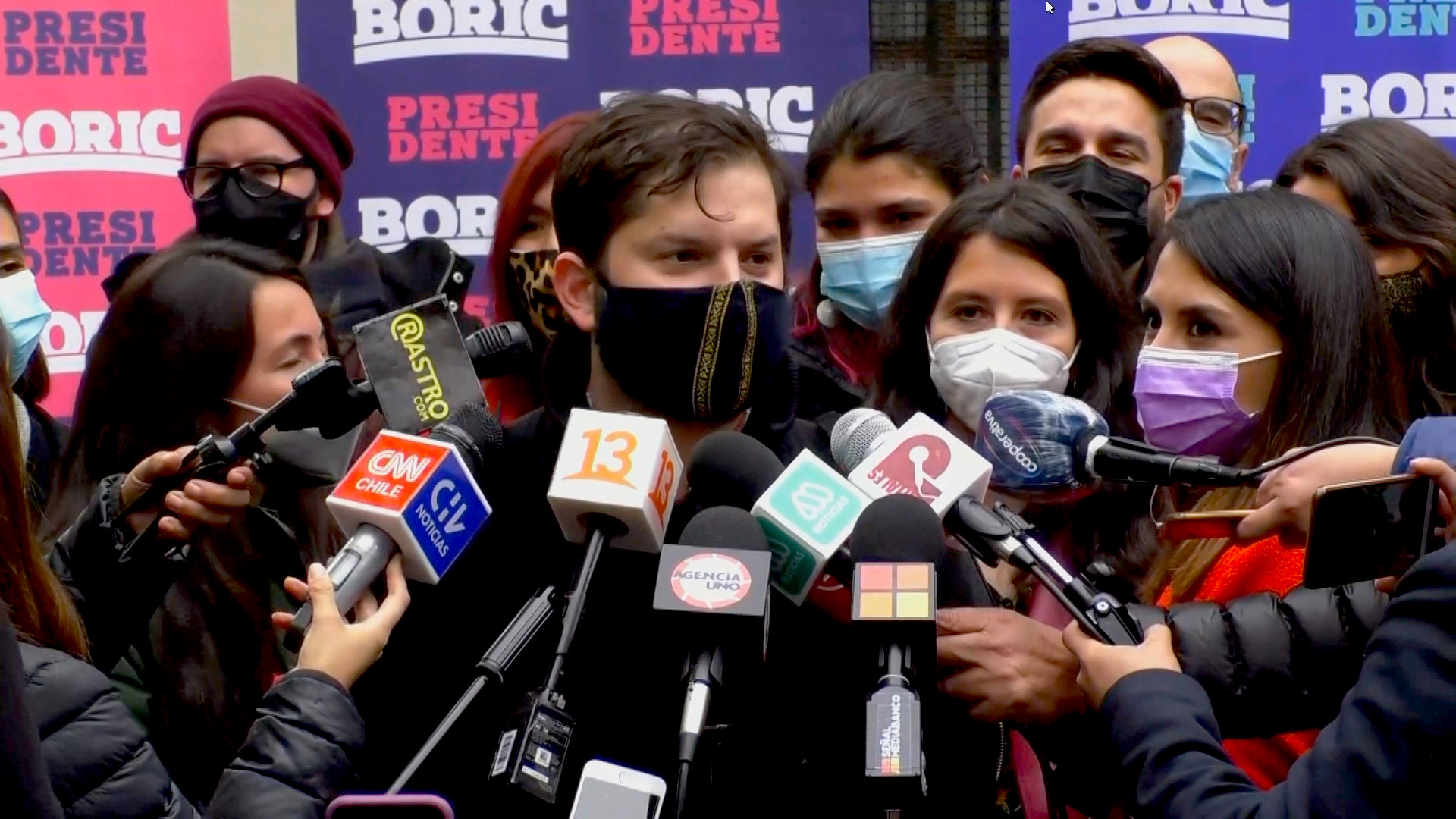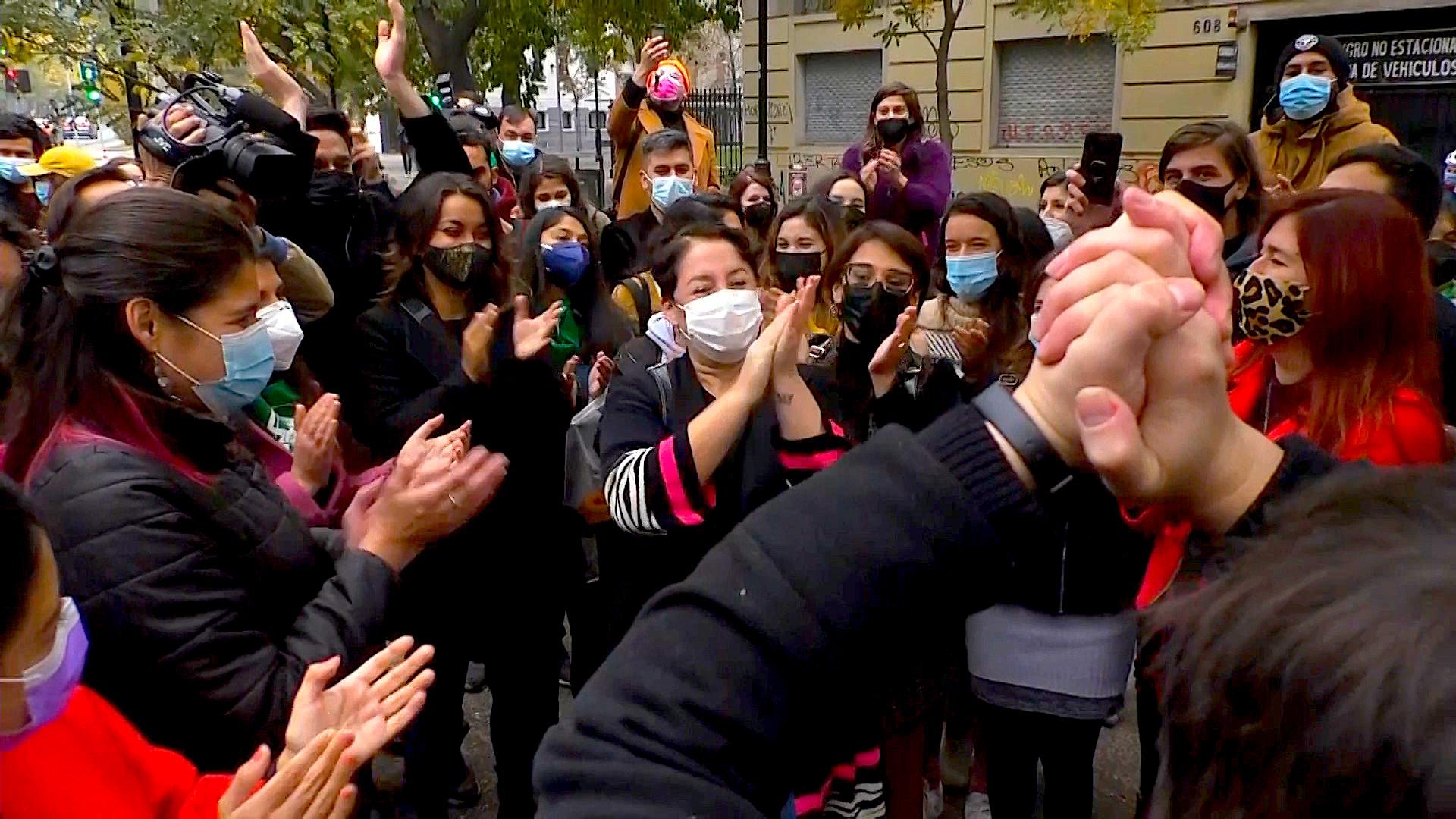“For decades, our people have expressed their dreams and hopes on the streets and in the squares,” Gabriel Boric’s party said after their candidate’s victory.

Gabriel Boric, Chile’s newly elected president, addressing supporters in May after collecting enough signatures to get on the ballot. (Mediabanco Agencia, Flickr, CC by 2.0)
Socialist Gabriel Boric’s victory in Chile’s high-stakes presidential election Sunday was hailed by progressives worldwide as an inspiring example of how a democratic groundswell can overcome deeply entrenched forces of reaction and chart a path toward a more just, equal and sustainable future.
Riding a massive wave of anger at Chile’s neoliberal political establishment and the economic inequities it has perpetuated, Boric — a 35-year-old former student activist — handily defeated José Antonio Kast, a lawyer and politician whom one commentator characterized as “easily as reactionary as far-right dictator Augusto Pinochet,” the leader of the U.S.-backed military junta that ruled Chile with an iron fist for nearly two decades.
Support CN’s Winter Fund Drive!
“At last. The specter of Pinochet is removed from Chile,” declared former Greek Finance Minister Yanis Varoufakis, a co-founder of Progressive International, which sent members of its observatory to monitor the election and ensure fairness.
“Congratulations to fellow Progressive International member Gabriel Boric,” Varoufakis added. “The hard work to redistribute wealth in Chile begins now.”
The Peace and Justice Project, an organization founded by former British Labour Party Leader Jeremy Corbyn, expressed hope that Boric’s resounding win will usher in “a bright new dawn in Latin American politics.”
Huge crowds in Chile see hope! https://t.co/h71A5Hrfyh
— Jeremy Corbyn (@jeremycorbyn) December 19, 2021
Boric, who ran on the promise to undo the lingering vestiges of Pinochet’s regime, will become the youngest president in Chile’s history when he takes office in March. The transition of power comes amid national turmoil fueled by the Covid-19 pandemic and deep-seated economic and political crises that have made the South American nation one of the most unequal OECD countries.
Last month, Chileans voted by an overwhelming margin to rewrite the nation’s Pinochet-era constitution, an indication of the widespread desire for systemic change.
“If Chile was the cradle of neoliberalism, it will also be its grave. Do not be afraid of the youth changing this country,” said Boric, who has vowed to cancel student debt, impose higher taxes on the wealthy, oppose environmentally destructive mining initiatives, and scrap Chile’s private pension system—another leftover from the Pinochet regime.
“We are a generation that emerged in public life demanding our rights be respected as rights and not treated like consumer goods or a business,” Boric said in his victory speech Sunday. “We no longer will permit that the poor keep paying the price of Chile’s inequality.”

Supporters of Chile’s Gabriel Boric on May 18, celebrating the collection of signatures needed to put him on the ballot. (Mediabanco Agencia, Flickr, CC by 2.0)
Leftist leaders across South America—including Bolivian President Luis Arce, Peruvian President Pedro Castillo, and former Brazilian President Luiz Inácio Lula da Silva—celebrated Boric’s win over his far-right opponent as a triumph for democracy.
“The victory you have achieved is that of the Chilean people and the Latin American peoples share it,” Castillo tweeted late Sunday. “Let us continue fighting for the unity of our nations.”
Progressive International member Convergencia Social, the left-wing political party led by Boric, said in a statement Monday that “for decades, our people have expressed their dreams and hopes on the streets and in the squares.”
“Through creativity and hope, we have built the road to a new Chile, one that is more democratic, one with social rights and a new way of relating to the environment,” the party said. “Now, we will travel down that road to a new Chile. Together, we will bury neoliberalism and rebuild the world.”
This article is from Common Dreams.
Help Us Cover the Assange Case!
Support CN’s
Winter Fund Drive!
Donate securely with PayPal
Or securely by credit card or check by clicking the red button:


How long will it take the US to find a reason to impose sanctions in order to get ready for another regime change?
Boric wasted no time “reaching out” to Kast, the Nazi, telling a huge gathering that he, Kast, needed to be involved in Chile’s future. A very bad sign. I give Boric about two years, maximum, before he starts betraying the vast majority of the people in Chile’s. Take a lesson from the Cubans. They knew every last Capitalist foot had to be behind the shut door. I realize Boric can’t realistically do that, but my God, propping up Kast as if he’s going to be part of your revolution is a deadly bad idea. The Left never learns.
“Chile’s.” Goddamn ironic auto-correct.
First of all, Kast actually conceded, which is nice gesture, one we in the States don’t take for granted anymore.
As he did in the runoff campaign, Boric needs to steer to the middle a little, if he wants to implement a Scandinavian style social democracy.
There are plenty of examples of impressive European industries within that model: Airbus, Siemens, Volvo, etc. If Boric can help the corporate interests in Chile see a good future for them, it helps the chances of everyone in Chile. Hopefully very few want to see a repeat of what happened in 1973 to Allende and to Chile. They impressively seem to have learned a very hard lesson, though it was a narrow victory.
In 2018 Boric travelled to NYC to have a conversation with a diverse group of businessmen and others in the Americas Society and the Council of the Americas, and came away impressed, saying it was a positive, constructive interaction, unlike what he was used to back in Santiago.
Chile desperately needs to cultivate some of that mixture, though it may seem divided & bleak right now. Hopefully Boric takes some of that experience from 2018 and more recently the advice of center-left economists to try and detoxify and calm the divided Chile.
Finding a social compact that builds upon Chile’s best resource – the people – will pave the way for a Scandinavian style success in Latin America. Many people are cheering for Boric, around the world.
Neoliberalizm needs to die. It is neither new nor liberal. It is better known by its original name – feudalism.
Thank you for pointing it out. People in the states don’t seem to understand that.
If the New York Times or the Washington Post begins referring to Boric’s government as a “regime,” watch out.
Today’s “Links” in Naked Capitalism has a photo of Boric delivering his acceptance speech while someone in the crowd shines a green laser pointer at his head: a not so subtle message from the forces of reaction and neoliberalism?
This makes two pessimists! I’m older, though apparently, none the wiser.
Hopefully the youthful generations of Chile, who have, through the democratic process finally been — so far, permitted the opportunity to attempt to bring their forefathers and mothers along, out of their long-time political stupor, to their senses, by once again introducing into the picture the possibility of a better, more progressive future, for all.
Let’s not forget though, it’s a fine line between being a realist and a pessimist, where the dark side of history, more brazenly than ever before, these days, continues to rear its ugly head.